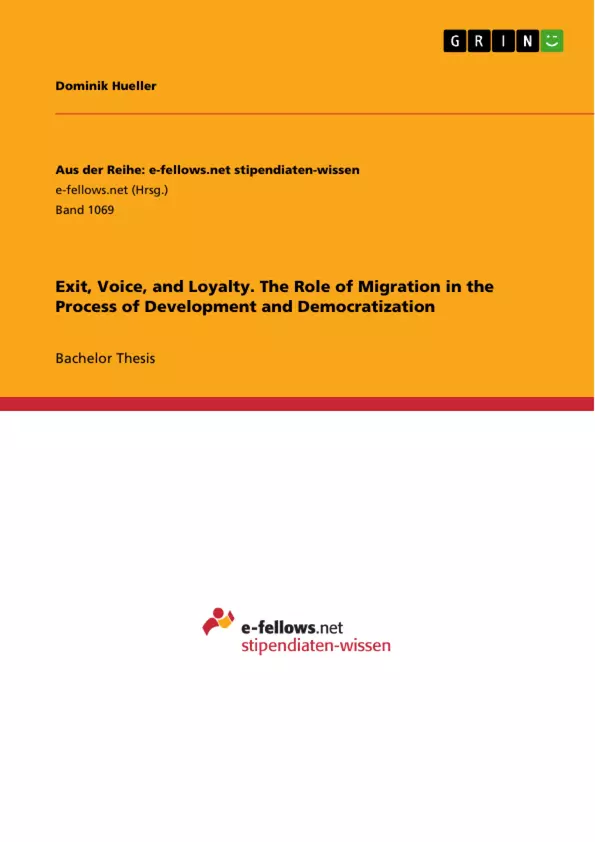The following thesis will examine the process of Development and Democratization. More precisely, it will prove whether Albert O. Hirschman’s “Exit, Voice, and Loyalty” (EVL)-
framework allows for a more coherent explanation of the transitional mechanisms.
In 1992 Paul Krugman raised the motion to rethink and resurrect the “high development theory” of the years prior to 1960. His “counter-counterrevolution” opposed the dominant neoclassical approach towards development and urged the scholarship to leave the intellectual parochialism and to take up the thread, laid out by scientists like Rosenstein-Rodan or
Hirschman.
Down to the present day, the scientific community of the development-science hasn’t been able to produce a “universally accepted doctrine or paradigm. Instead (there is) a continually,
evolving pattern of insights and understandings that together provide the basis for learning the possibilities of contemporary development […].”
The four predominant theories in the history, namely Modernization Theory, Structural-Change, Dependency School and the Neoclassical Market-Fundamentalism will be introduced
and shown how the role of migration is integrated respectively.
Hereinafter the EVL-concept will be explained and whether it can give further insights into the nexus of development and democracy.
The set-up hypothesis, which will be tested, is the following: The initial point is an authoritarian regime. Once a country achieved a certain threshold of development, the people do not
only have the inherently volition of freedom but also the ability to articulate their demands. If we assume that the former mentioned concept of “Exit, Voice, and Loyalty” can be applied,
the people have three options to do so. They can go literally or metaphorically on the streets and raise their voice against the incumbent regime or they can migrate from their homecountry
to another state, where a modern political system is already in place. The last alternative is that they do neither and continue with their ordinary life, staying loyal to the current government. To encapsulate, we should be able to spot a higher degree of democracy in a particular country if the rate of emigration is lower, than in a country where the people just leave their patria.
Inhaltsverzeichnis (Table of Contents)
- List of Illustrations and Tables
- Illustrations
- Tables
- Introduction
- Introduction to the topic
- Definition of key-terms
- Democracy
- Development
- The Exit-Voice-Loyalty Framework
- Empirical Analysis
- Discussion
- Development Theories
- Modernization Theory
- Structural View
- Exit and Voice
- Exit
- Voice
- Development Theories
- Ramifications of Migration on Development
- Conclusion
Zielsetzung und Themenschwerpunkte (Objectives and Key Themes)
This thesis aims to analyze the relationship between development, democratization, and migration. It explores whether Albert O. Hirschman's "Exit, Voice, and Loyalty" framework can offer a more comprehensive understanding of the transitional mechanisms involved in these processes. Specifically, the study examines the role of migration as a potential tool for individuals to influence political and economic development. Key themes explored in the text include:- The Exit-Voice-Loyalty framework as a tool to analyze development and democratization
- The relationship between migration and development
- The role of development in fostering democratic transitions
- Different theoretical perspectives on development, including Modernization Theory and Structural Change
- The impact of migration on political systems and institutions
Zusammenfassung der Kapitel (Chapter Summaries)
The introduction sets the stage for the thesis by outlining its scope and purpose. It defines key terms, such as democracy, development, and the Exit-Voice-Loyalty framework, providing context for the analysis. The empirical analysis section explores the relationship between development, democracy, and migration through data and statistical methods. This section aims to provide evidence-based support for the arguments presented in the subsequent discussion. The discussion chapter delves into the theoretical framework for understanding development and examines the role of migration within this framework. This chapter considers different perspectives on development, including Modernization Theory and Structural Change, and analyzes how migration influences these theories. The chapter on the ramifications of migration on development focuses on the specific impacts of migration on development processes. It examines how migration can influence both positive and negative outcomes for development.
Schlüsselwörter (Keywords)
This work focuses on the themes of development, democratization, migration, and the Exit-Voice-Loyalty framework. It explores the relationship between these concepts, drawing on theoretical perspectives and empirical data to provide a comprehensive understanding of their interplay. Key terms and concepts explored include: modernization theory, structural change, migration patterns, political institutions, and economic growth.Frequently Asked Questions
What is the "Exit, Voice, and Loyalty" framework?
Developed by Albert O. Hirschman, it describes the options individuals have when a state or organization declines: they can leave (Exit), protest (Voice), or remain (Loyalty).
How does migration affect democratization?
The thesis explores if migration (Exit) reduces the pressure for political change, as those who would otherwise demand reform (Voice) leave the country.
Which development theories are analyzed in the text?
The work introduces Modernization Theory, Structural-Change, Dependency School, and Neoclassical Market-Fundamentalism.
What is the main hypothesis of the thesis?
It suggests that a higher degree of democracy may be found in countries where emigration rates are lower, as citizens are more likely to stay and fight for political change.
Who is Paul Krugman in the context of this study?
Krugman is cited for his call to rethink "high development theory" and move beyond neoclassical approaches to understand economic transitions.
- Citation du texte
- Dominik Hueller (Auteur), 2014, Exit, Voice, and Loyalty. The Role of Migration in the Process of Development and Democratization, Munich, GRIN Verlag, https://www.grin.com/document/285526



